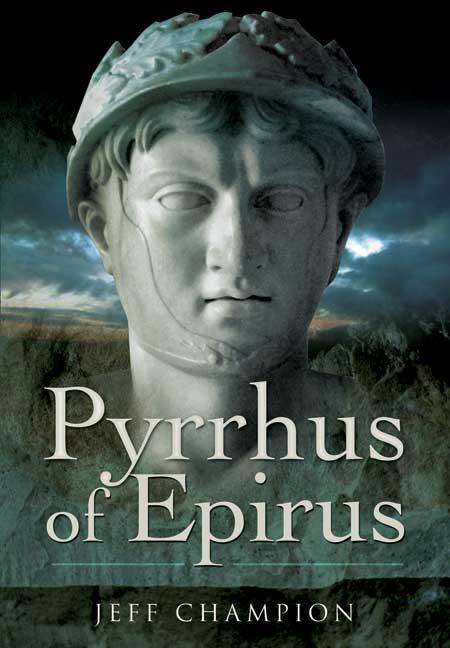Pyrrhus of Epirus (ePub)
Imprint: Pen & Sword Military
File Size: 5.2 MB (.epub)
Pages: 176
ISBN: 9781844682829
Published: 16th July 2009
| Other formats available | Price |
|---|---|
| Pyrrhus of Epirus Paperback Add to Basket | £12.99 |
Pyrrhus was born into the royal house of Epirus, northwest Greece, but his mother was forced to flee into exile to protect his life when he was a mere infant. Yet he prospered in troubled times and rose from a refugee to a king. Always an adventurer he was deeply involved in the cut-and-thrust campaigning, coups and subterfuges of the Successor kingdoms. At various times he was king of Epirus (twice), Macedon (twice) and Sicily, as well as overlord of much of southern Italy.
In 281 BC he was invited by the southern Italian states to defend them against the aggressive expansion of the Rome. His early victories at Heraclea and Asculum were so hard-fought that a 'Pyrrhic victory' still means one gained at crippling cost. These were the first fascinating duels between the developing Roman legions and the hitherto-dominant Hellenistic way of war with its pike phalanxes and elephants.
Pyrrhus ultimately failed in Italy and Sicily but went on to further military adventures in Greece, eventually being killed while storming the city of Argos.
Champion does a good job of placing Pyrrhus in the context of his times, and of dealing with the often difficult or fragmentary sources, to present a rounded portrait of a figure who so often appears as a supporting character in the story of Rome.
History of War - John Rickard
Read the complete review here.
Originally published in 2009, Champion’s life of Pyrrhus – named by Hannibal as second only to Alexander the Great as a commander – was very well received. Quickly accepted as the standard work on the man, fitting him into his times and exploring in considerable detail his campaigns against Romans, Carthaginians, and fellow Greeks, the book has long been hard to find, and this reissue, although not a revision, is very welcome.
NYMAS Review, Spring 2017
Well-written and stuffed full of history of not only the man, but also his time, this book is very easy to recommend.
A Wargamers Needful things
Read the full review here.
When schools taught Ancient Greek and Latin, the study of Classics and Ancient History was a popular area of history. Many schoolchildren left with an understanding of the history of Ancient Greece and the movement of power to Rome. Today that has shrunk for
Firetrench
so many to an understanding delivered by Hollywood that all too often provides great entertainment but very poor history. Here, the
author has provided a portrait of one of the key figures of the period, often described as the Successor Kingdoms, as the City
States of Ancient Greece were replaced by a rapidly growing and aggressive Rome as the centre of ancient power in the Mediterranean
and beyond. A great read and an important work.
Read the full review here.
It is given to few men or women to lend their names to a word that remains in circulation for more than two thousand years, but such was the fate of Pyrrhus of Epirus who lived from 319 BCE to 272 BCE. When we speak of a 'pyrrhic' victory we mean one achieved at such cost that it seems almost as bad as a defeat. Few who use the word know that it was first coined after still know anything about the battle or Pyrrhus. It is an impressive mark of the quality of classical scholarship in Western Australia that the answers have been provided by Jeff Champion, a local graduate working outside the security of academic tenure.
Geoffrey Bolton, Napoleonic Wargaming Society
Pyrrhus was one of the most outstanding of the warring princes and generals who contended for the inheritance of Alexander the Great after the Macedonian's premature death in 323 BCE. He could claim kinship through Alexander's terrible mother Olympias, but he began life under hazardous circumstances. His father was one of the more unlucky contenders for the throne of Epirus, in what is now the north-west of modern Greece, and Pyrrhus was forced into exile at the age of three. He was brought back as king at the age of eleven, driven into exile again at seventeen, and returned at the age of twenty-two in 297 BCE to retain his grip on the throne until his death twenty-five years later.
'The overall picture that emerges of Pyrrhus is of an individual of burning ambition, and almost totally absorbed by fighting and military matters,' Champion informs us, adding: 'He was reputed to be kind towards his close friends, capable of charming his superiors, but aloof and arrogant towards his social inferiors.' As a military leader Pyrrhus followed the Macedonian practice of grouping his infantry into a compact phalanx. He was quick to adopt the pike as a weapon of preference. As Champion explains: 'When formed up the pikes of the first rank of the phalanx would extend four metres beyond the line. In addition, the spearheads of the next four ranks would reach past the first rank. The following eleven ranks would angle their pikes overhead to provide a shelter from enemy missiles.' He also used elephants in warfare. This made up a formidable fighting machine and Pyrrhus scored many more victories than defeats. Unfortunately he does not seem to have been much of a long-term strategist. His campaigns were opportunistic, taking advantage of a neighbour's temporary weakness or seeking to secure an advantage among the shifting alliances of Alexander's successor kingdoms. He was most consistently engaged in southern Italy, though even there he changed tack, sometimes concentrating on establishing himself in Sicily and at other times confronting the southward thrust of the young Roman republic. Twice he tried to seize the hegemony of Macedonia, and it was in the second attempt that he finally met his death in battle.
Champion is a lucid writer who compels our interest as he leads us through the vicissitudes of Pyrrhus's career. Some readers might find the first chapter heavy going as he takes us through the bewildering dynastic squabbles among Alexander's successors, many of whom had the same names as their cousins and rivals. It is worth persevering. Champion brings to life a significant figure from the ancient world who was confronted with many issues which remain relevant in modern military leadership. This book can be recommended to lovers of biography who want to try something a little different.
It is a nice and readable book and a job well done.
Ancient Warfare Magazne
About Jeff Champion
Jeff Champion is a Customs and Excise officer in Australia. He has written numerous articles on Hellenistic warfare for specialist journals such as Slingshot, the journal of the Society of Ancients. His first book, Pyrrhus of Epirus, was published by Pen & Sword in 2009 and volume I of Tyrants of Syracuse was published in the autumn of 2010.



















